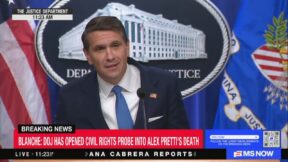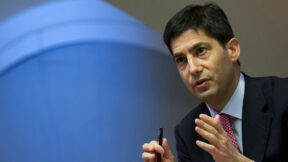NPR Editor Responds to Public Criticism From Veteran Journo in Internal Memo to Staff: ‘Strongly Disagree’

Uri Berliner, a 25-year veteran of NPR’s newsroom, took aim at his employer in a scathing essay on Tuesday, one which quickly drew a rebuke from Edith Chapin, the editor-in-chief and acting chief content officer of NPR News.
“I’ve Been at NPR for 25 Years. Here’s How We Lost America’s Trust,” blared the headline of Berliner’s essay in Bari Weiss’s The Free Press. Berliner, an award-winning journalist and graduate of the Columbia School of Journalism, began his essay by noting that he is indeed the model of a coastal elite who fits in perfectly at NPR.
“It’s true NPR has always had a liberal bent, but during most of my tenure here, an open-minded, curious culture prevailed. We were nerdy, but not knee-jerk, activist, or scolding,” Berliner wrote, adding:
In recent years, however, that has changed. Today, those who listen to NPR or read its coverage online find something different: the distilled worldview of a very small segment of the U.S. population.
Berliner’s essay goes on to cite specific examples in which NPR’s coverage in recent years “faltered” and he argues that while he too opposes Trump, the newsroom actively worked to “damage or topple Trump’s presidency.”
Chapin put out a lengthy reply to Berliner and kicked off by writing in part:
I and my colleagues on the leadership team strongly disagree with Uri’s assessment of the quality of our journalism and the integrity of our newsroom processes.
We’re proud to stand behind the exceptional work that our desks and shows do to cover a wide range of challenging stories. We believe that inclusion – among our staff, with our sourcing, and in our overall coverage – is crucial to telling the nuanced stories of this country and our world.
While most of Chapin’s message defended her newsroom’s practices, she added, “With all this said, none of our work is above scrutiny or critique. We must have vigorous discussions in the newsroom about how we serve the public as a whole, fostering a culture of conversation that breaks down the silos that we sometimes end up retreating to. Ideally, we engage in this debate respectfully, with the goal of lifting up and strengthening each other’s work.”
__
New: The Mediaite One-Sheet "Newsletter of Newsletters"
Your daily summary and analysis of what the many, many media newsletters are saying and reporting. Subscribe now!






Comments
↓ Scroll down for comments ↓